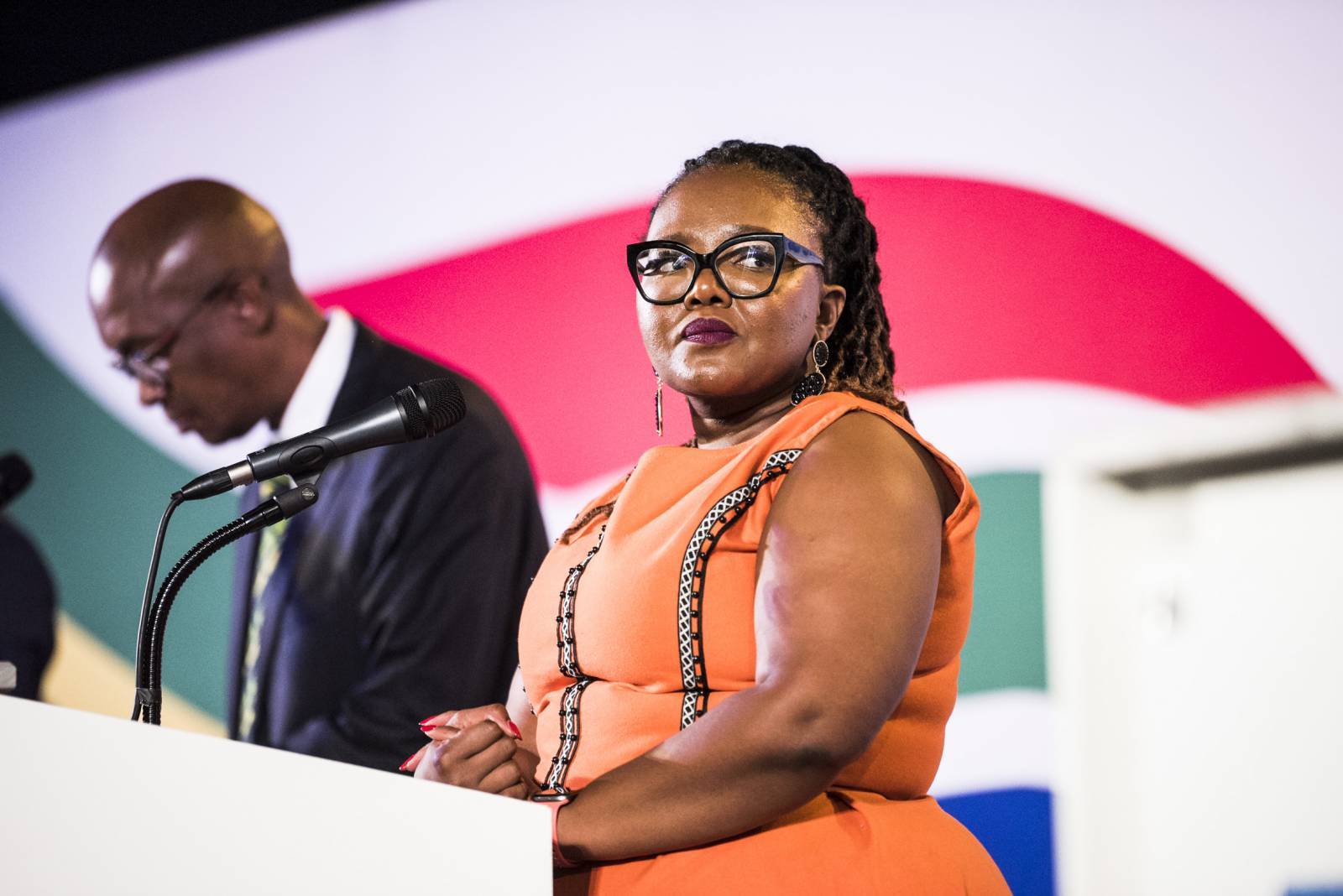Hundreds of women dressed in blue and white church uniforms, green and black African National Congress Women’s League gear and new yellow Women’s League T-shirts had just finished singing songs honouring Thabo Mbeki. ”50/50 re a rata / Hela Basadi / Thabo Mbeki re mo ratile [We love the ANC’s 50% gender balance / We women / We love Thabo Mbeki],” they sang.
The songs were followed by gasps of shock as ANC Women’s League provincial chairperson Sisi Ntombela told a harrowing story of how one of the league’s members, Teboho Mazibuko, had been murdered by her husband days before she was due to attend the ceremony to honour Mbeki.
In graphic detail, Ntombela told of how Mazibuko’s husband had placed her head across a table-like structure and proceeded to bludgeon her with an axe. The domestic row had started as a result of her plans to come to Qwaqwa for the Mbeki rally, and her inquiries about money to buy clothes for their unborn child.
Ntombela’s speech was a rare moment of sobriety in the otherwise jolly atmosphere of Mbeki’s weekend imbizo programme in the Eastern Free State. Women cheered wildly as they thanked Mbeki for his efforts to promote their gender. They presented him with a seanamarena (Sesotho blanket), a modianyeho (Sesotho hat) and a pipe.
”Through your visionary leadership, the potential of women is being realised. Women are now not only good in catering and mobilisation, but in leading the country too,” they said in a memorandum to the president.
In his acceptance speech, Mbeki said he believed he should be succeeded by a woman president. The idea has since been cold-shouldered by ANC deputy president Jacob Zuma, who this week said it was Mbeki’s personal opinion and he should raise it within ANC structures.
”I work in government with many women and I can report to you that there is not a single man, including the president himself, who works better than the women. If anybody says men are better than women, they are not telling the truth,” said Mbeki.
His vision was also reflected in the composition of the delegation that accompanied him to the Eastern Free State, with only one male minister, Provincial and Local Government Minister Sydney Mufamadi, on the team. The rest of delegation comprised Minerals and Energy Minister Lindiwe Hendricks, Deputy Trade and Industry Minister Elizabeth Thabethe, Agriculture and Land Affairs Minister Thoko Didiza, Deputy Safety and Security Minister Susan Shabangu and presidential legal adviser Mojanku Gumbi.
But on the ground it was a different story. When the four local mayors of the Thabo Mofutansanya district were introduced to Mbeki, all were male. When the municipal managers were asked to stand up, they were all men.
At the imbizo in Zenzeleni township outside Warden, it was mostly women who spoke out about the lack of access to government services and protection.
An emotional Martha Ncira asked Mbeki: ”Who is supposed to look after us farmworkers? We are badly treated and evicted, but no one speaks for us. Right now the boers are chasing me out of the farm and telling me to sell my three cows.
”How am I going to fund the education of my children? Are my children not good enough for an education? The boers hid information about the president coming here, but I got this booklet from Mufamadi’s department about all the services that govern-ment provides. It has all the good news, but we do not see any of these things. Even on TV we see all these ministers make good promises, but we do not benefit.”
Residents were up in arms about the fact that Zenzeleni is one of the few towns still using the bucket system of ”sanitation”. Unemployed Nomsa Radebe, who lives with her father and six brothers and their children in a five-roomed house, was sceptical about government plans to do away with the buckets.
”The municipality has left pipes on the streets and they expect us to buy more pipes to connect to the house — and you build the toilet yourself. We cannot afford that. Toilets are very expensive,” said Radebe.
Radebe said her family had used candles and paraffin for the past four years because the council cut off their electricity after they fell behind on their service payments.
”I don’t know if we can have proper toilets when we do not even have electricity. The mayor doesn’t care. I went to school with him. But he now drives a big, fancy car and his whole family lives in town,” she lamented.
Mbeki replied that the government did not have the resources to fulfill all rights enshrined in the Constitution. He pleaded with residents to be patient. ”If we decide to put all the money into paying for the education of all black students, we must agree that we are going to stop building houses for the next five years. Our problems will not all be solved in one day or one week. It can’t be done.”


